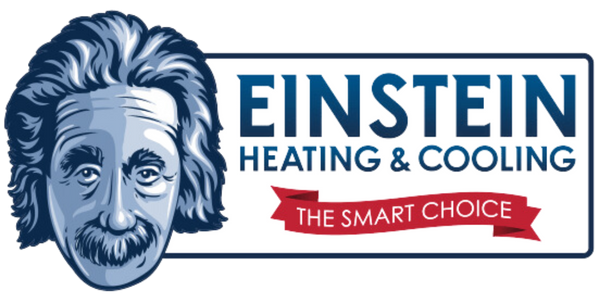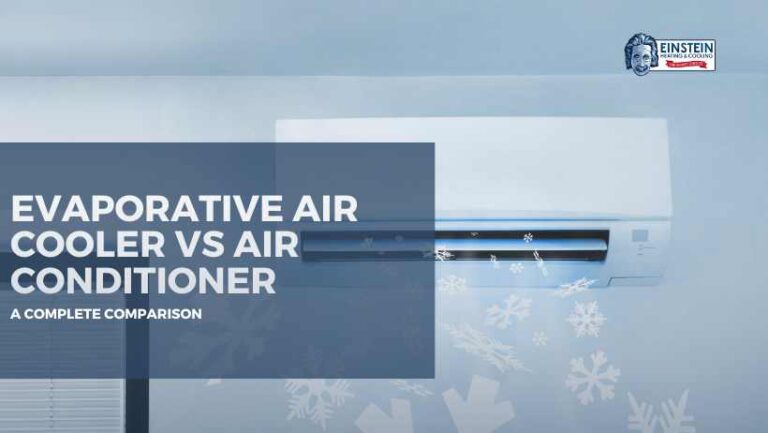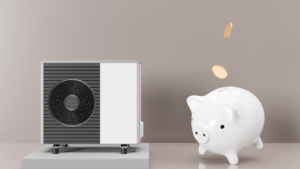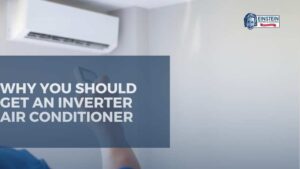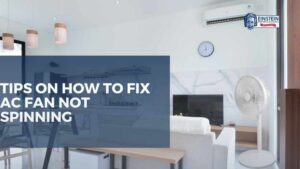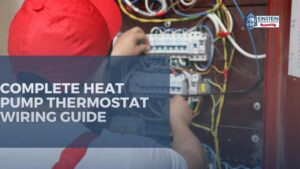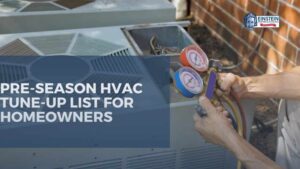Choosing an evaporative air cooler vs air conditioner can be difficult. When it comes to keeping your living space cool during hot weather, two popular options stand out: evaporative air coolers and traditional air conditioners. Each system has its advantages and disadvantages, and choosing the right one, whether an evaporative cooler vs air conditioner, depends on your specific needs and preferences. In this comprehensive guide, we’ll delve into various factors that differentiate evaporative air coolers from air conditioners, helping you make an informed decision for your cooling needs.
Efficiency and Energy Consumption
Evaporative Air Cooler
Evaporative air coolers, also known as swamp coolers, are renowned for their energy efficiency. These units rely on the natural process of evaporation to cool the air. They use significantly less electricity compared to air conditioners, making them an environmentally friendly and cost-effective choice.
Air Conditioner
Air conditioners, on the other hand, typically consume more energy. They rely on a refrigeration cycle to cool the air, involving compressors and other mechanical components. While they provide effective cooling, they tend to be less energy-efficient than evaporative coolers.
Comparing the Humidity Level of An Evaporative Air Cooler vs Air Conditioner
Evaporative Air Cooler
Evaporative coolers add moisture to the air during the cooling process. This can be beneficial in dry climates, as it helps combat excessively low humidity levels. However, in humid environments, the additional moisture may be less desirable.
Air Conditioner
Air conditioners, by contrast, tend to reduce humidity levels. They extract moisture from the air as part of the cooling process. This makes air conditioners a preferred choice in areas where high humidity is a concern.
Cooling Mechanism
Evaporative Air Cooler
Evaporative air coolers operate on a simple and natural principle. They pull warm air through water-saturated pads, where the air is cooled through evaporation. The cooled air is then circulated into the living space. This process is effective in moderately dry conditions.
Air Conditioner
To compare evaporative coolers vs air conditioners, we must consider their cooling mechanism. Air conditioners utilize a more complex refrigeration cycle. They extract heat from indoor air and transfer it outside, cooling the air before circulating it back into the room. While this method is effective in various climates, it requires more energy and components compared to evaporative coolers.
Installation and Portability
Evaporative Air Cooler
Evaporative coolers are generally easier to install and more portable than air conditioners. They do not require intricate ductwork or permanent installation. Many models are equipped with wheels, allowing for convenient relocation within the home.
Air Conditioner
Air conditioners often require professional HVAC installation, involving the placement of indoor and outdoor units, as well as the installation of ductwork. This makes them less portable and more challenging to install without professional assistance.
Environmental Impact
Evaporative Air Cooler
Evaporative air coolers have a minimal environmental impact. They use water and air movement to cool the space, consuming less electricity and producing fewer greenhouse gas emissions compared to air conditioners.
Air Conditioner
Air conditioners, particularly those using refrigerants with high global warming potential, can have a more significant environmental impact. The manufacturing, transportation, and operation of air conditioners contribute to their carbon footprint.
Maintenance Requirements
Evaporative Air Cooler
To compare the evaporative cooler vs the air conditioner, we must check the maintenance needs. Evaporative coolers are relatively easy to maintain. Regular tasks include cleaning water pads, checking water levels, and ensuring proper ventilation. Some models may require occasional water treatment to prevent mineral buildup.
Air Conditioner
Air conditioners typically require more extensive HVAC maintenance. Tasks may include cleaning or replacing air filters, checking refrigerant levels, and ensuring the proper functioning of compressors and other mechanical components. Hiring a professional HVAC technician is often recommended.
Cost Considerations
Evaporative Air Cooler
In comparing an evaporative air cooler vs an air conditioner, consider the costs. Evaporative coolers are generally more budget-friendly upfront. Their lower energy consumption also translates to lower operational costs over time. However, the cost-effectiveness may vary depending on factors such as local energy prices and the frequency of use.
Air Conditioner
Air conditioners typically have higher upfront costs, including installation expenses. While they may be more expensive to purchase and install, their long-term operational costs depend on factors such as energy efficiency and usage patterns.
Effectiveness in Different Climates
Evaporative Air Cooler
Evaporative coolers excel in dry climates. They are most effective when the air is dry and the humidity levels are relatively low. In humid climates, the cooling effect may be less pronounced.
Air Conditioner
Air conditioners are versatile and effective in a wide range of climates. They can provide consistent cooling in both dry and humid conditions. This makes them a reliable choice for various geographical locations.
Noise Levels
Evaporative Air Cooler
Evaporative coolers are generally quieter than air conditioners. They operate using a fan and a water pump, producing minimal noise during operation. This can be advantageous, especially during the night or in quiet living spaces.
Air Conditioner
Air conditioners, particularly window units and older models, can be noisy during operation. The compressor and fan components contribute to the overall noise level. However, newer models often feature advanced technologies aimed at reducing noise.
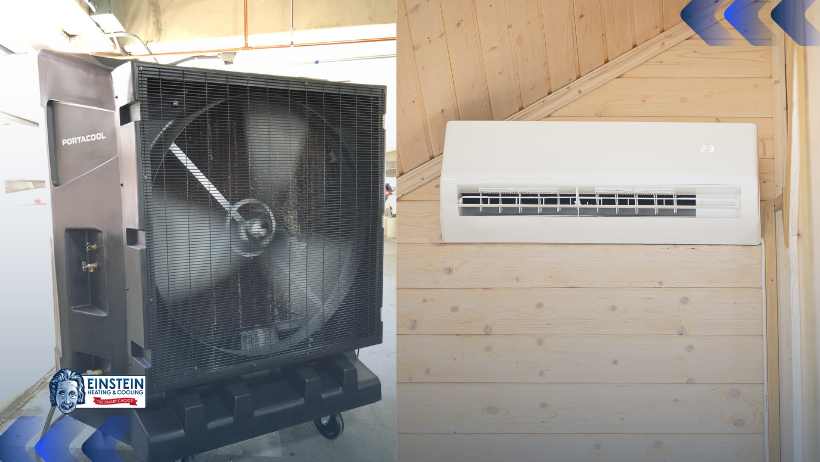
Health Considerations
Evaporative Air Cooler
In comparing evaporative air cooler vs air conditioner, remember to consider your health. Evaporative coolers are considered healthier for indoor air quality. They add moisture to the air, which can be beneficial for individuals with respiratory issues or dry skin. However, it’s essential to ensure proper maintenance to prevent mold or bacteria growth in the water pads.
Air Conditioner
Air conditioners, while effective at cooling the air, may contribute to dry indoor air. This can be less comfortable for individuals with respiratory sensitivities or skin conditions. Using a humidifier alongside an air conditioner can help address this concern.
Availability of Features
Evaporative Air Cooler
Evaporative coolers often come with basic features such as adjustable fan speeds and water level indicators. Some models may include additional features like remote control and programmable timers. While they may lack advanced technologies, they offer practical functionalities for effective cooling.
Air Conditioner
Air conditioners are available with a wide range of features, including programmable thermostats, air purification systems, and smart home integration. Higher-end models may offer advanced capabilities such as humidity control and zoning options, providing users with more customization.
Space Requirements
Evaporative Air Cooler
Evaporative coolers are generally more compact than air conditioners. They can be suitable for smaller living spaces or areas where floor space is limited. The portability of many evaporative coolers adds to their versatility in various room layouts.
Air Conditioner
Air conditioners, especially central systems, require more significant space for installation. This includes both indoor and outdoor units, as well as ductwork. The space requirements may influence the feasibility of installing an air conditioner in specific settings.
Long-Term Durability
Evaporative Air Cooler
Evaporative coolers are known for their simplicity, which often translates to greater durability. With fewer mechanical components, there are fewer points of potential failure. Proper maintenance, including regular cleaning and occasional part replacement, can extend their lifespan.
Air Conditioner
Air conditioners, with their intricate refrigeration systems, may be more prone to mechanical issues over time. Regular maintenance is crucial to ensure longevity, and a professional HVAC technician may be necessary for repairs or component replacements.
Evaporative Air Cooler Maintenance
1. Cleaning and Replacement of Cooling Pads
Regular Inspection
- Inspect cooling pads monthly for signs of wear, dirt, or mineral deposits.
- Check for any physical damage that may hinder efficient water absorption.
Cleaning Procedure
- Turn off the unit and disconnect the power before cleaning.
- Gently clean cooling pads with a soft brush or hose to remove accumulated dust and debris.
- If mineral deposits are present, soak pads in a mixture of water and mild detergent before cleaning.
Replacement Schedule
- Replace cooling pads at least once a year or when significant wear and tear are observed.
- Use manufacturer-recommended pads for optimal performance.
2. Water Management
Draining and Cleaning the Water Tank
- Regularly drain and clean the water tank to prevent the growth of algae and mold.
- Use a mixture of water and vinegar for thorough cleaning.
Checking Water Levels
- Ensure the water level in the tank is maintained according to the manufacturer’s guidelines.
- Adjust the water supply to prevent pump damage due to insufficient water.
4. Exterior and Ventilation
Fan Blades
- Clean fan blades regularly to maintain efficient airflow.
- Ensure the fan is securely attached and replace any damaged blades.
Housing Inspection
- Check the exterior housing for cracks or damage.
- Repair or replace housing components to prevent air leakage in your air conditioner.
Air Conditioner Maintenance
1. Air Filter Replacement
Frequency
- Replace or clean air filters every 1-3 months, depending on usage.
- High-usage or allergy-prone households may require more frequent replacements.
Importance
- Clean filters ensure optimal airflow and prevent the accumulation of dust and allergens.
- Clogged filters increase energy consumption and strain on the cooling system.
2. Coil Cleaning
Evaporator Coils
- Clean evaporator coils annually to maintain efficiency.
- Use a soft brush or vacuum cleaner to remove dust and debris.
Condenser Coils
- Inspect and clean condenser coils regularly, especially if located outdoors.
- Trim vegetation around outdoor condenser units to maintain proper airflow.
3. Refrigerant Levels
Professional Inspection
- Schedule annual professional maintenance to check refrigerant levels.
- Low refrigerant levels can reduce cooling efficiency and cause system damage.
Leak Detection
- Regularly check for refrigerant leaks, indicated by oil stains or reduced cooling performance.
- Promptly repair any identified leaks to prevent further damage.
4. Thermostat Calibration
Accuracy
- Calibrate thermostats to ensure accurate temperature readings.
- Consider upgrading to a programmable thermostat for energy-efficient temperature control.
Battery Replacement
- Replace thermostat batteries annually to prevent malfunctions.
- Low batteries can lead to inaccurate temperature settings and system inefficiency.
5. Ductwork Inspection
Sealing Leaks
- Inspect ductwork for leaks and seal any gaps to prevent cooled air loss.
- Leaky ducts can reduce energy efficiency and strain the cooling system.
Cleaning
- Clean ducts periodically to remove dust and debris.
- Schedule professional duct cleaning from expert HVAC technicians from Einstein Heating and Cooling if extensive buildup is observed.
Conclusion
In the evaporative air cooler vs. air conditioner comparison, each option has its unique advantages and drawbacks. Evaporative air coolers offer energy efficiency, simplicity, and suitability for specific climates, while air conditioners provide precise temperature control and adaptability to various environments.
Ultimately, by carefully weighing the factors discussed in this guide, you can make an informed decision that aligns with your preferences and ensures a comfortable living environment, regardless of the outside temperature.
